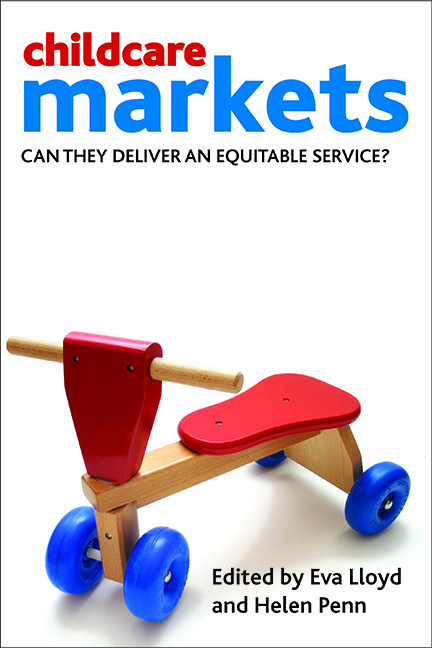four - Local providers and loyal parents: competition and consumer choice in the Dutch childcare market
Published online by Cambridge University Press: 01 September 2022
Summary
Introduction
Throughout Europe, an important policy shift in recent years concerns the introduction of market forces in sectors that have traditionally been organised as a public responsibility. Relevant examples in this respect are the energy market and health insurance (Cutler, 2002; Giulietti et al, 2003). The main reason for the transition of public to private is the assumption that the market will create a more efficient incentive structure, as the market driven approach will increase competition and force suppliers to increase internal efficiency, resulting in lower prices. In addition, the introduction of market forces may lead to a better balance between supply and demand. Consumers are expected to select the provider that offers the best price/quality ratio and the sector may adapt quicker to changing circumstances. The introduction of market forces should therefore increase both internal as well as external efficiency.
In line with this overall trend, the Dutch childcare sector was completely reorganised by the introduction of the 2005 Childcare Act. This Act was perceived as a thoroughly modern piece of legislation, because financial support is redirected from the local authorities to the parents with the aim to increase parental choice. The explicit objective of this childcare reform was to stimulate the operation of market forces, so that childcare providers would respond to parental wishes in an efficient way. The government no longer set the targets, for instance ‘an increase of 20,000 childcare places in 2010’, but the consumer was supposed to persuade the supplier by the laws of supply and demand. As a result of the change towards a demand driven financing system, publicly provided childcare in the Netherlands disappeared. Instead only private for-profit (60% of all Dutch childcare organisations) or not-for-profit providers (the remaining 40%) are now operating and competing in the childcare market (Noailly and Visser, 2009).
The introduction of the Childcare Act did not go unnoticed. All conditions for extensive media coverage were present: a recognisable and sensitive product, a large number of parents affected (most of them well educated) and a clear shift in policy. Five years after its introduction, however, most of the dust seems to have settled and the childcare sector and childcare consumers seem to have got used to the new opportunities and responsibilities.
- Type
- Chapter
- Information
- Childcare MarketsCan They Deliver an Equitable Service?, pp. 63 - 78Publisher: Bristol University PressPrint publication year: 2012

